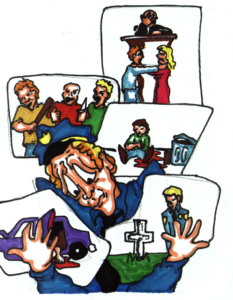Police Psychology | Parkinson’s Law
by Gary S. Aumiller, Ph.D. ABPP
In 1955, a year before my birth, an English historian who had worked in civil service was written up in the magazine “The Economist” about a law of nature that would control my life, in fact, controls many of us. He said “work expands to fill the time available for its completion.” “Data expands to fill the storage available” is a corollary to the initial observation and finally “if you  spend 10 hours on a project you will be twice as far behind than if you only spend five hours on the project.” I think these were meant to be humorous, but I am not exactly laughing about them. In fact, it may have been true back then, but now it is more like work expands to fill any time in the day, including the time set aside for relaxation and comfort, and sometimes even dinner.
spend 10 hours on a project you will be twice as far behind than if you only spend five hours on the project.” I think these were meant to be humorous, but I am not exactly laughing about them. In fact, it may have been true back then, but now it is more like work expands to fill any time in the day, including the time set aside for relaxation and comfort, and sometimes even dinner.
Why does this happen? Why does it seem we are always running out of time? Why do deadlines appear even when they are not apparent at first? Of course, there is the obvious, that people’s natural tendency to procrastinate work causes deadlines to appear that didn’t exist before. People want to do non-work things more than work things. Deadlines are unnatural and imposed on us usually from outside. Everybody gets that. But what are the other reasons that works expands to fill the time allotted or usually more than the time allotted? How is it that we always seem to underestimate the time needed to complete a project? (more…)
 Thin Blue Mind / Smokey Heroes
Thin Blue Mind / Smokey Heroes


 more then anyone in the room on the topic and when I left the room, everyone was supposedly impressed as hell. Then I came back in the room, and was told that they felt I was too obsessed with the topic and I needed to learn how to live instead of just the science. See my mom had died in my first year of graduate school, and I had finished a five-year program in 3 ½ years, and my dissertation was three times the size of most of the dissertations they had seen. The committee gave me an exercise in the book The Magic of Thinking Big and said I wasn’t finished my school until I did the exercise. I was in shock, but I went home and absorbed the book before I went to sleep (I guess I did tend to obsess) and the exercise was to make a “wish list” of the things I wanted to do in my life. My list should be 100 items long and I was to think big.
more then anyone in the room on the topic and when I left the room, everyone was supposedly impressed as hell. Then I came back in the room, and was told that they felt I was too obsessed with the topic and I needed to learn how to live instead of just the science. See my mom had died in my first year of graduate school, and I had finished a five-year program in 3 ½ years, and my dissertation was three times the size of most of the dissertations they had seen. The committee gave me an exercise in the book The Magic of Thinking Big and said I wasn’t finished my school until I did the exercise. I was in shock, but I went home and absorbed the book before I went to sleep (I guess I did tend to obsess) and the exercise was to make a “wish list” of the things I wanted to do in my life. My list should be 100 items long and I was to think big. and shouldn’t be used. In fact, you are hard pressed to even begin to find one article that says it worked once in the history of man. That bothers me. Why is it even considered if it hasn’t worked once in the entire history of the world? Can’t anyone except Donald Trump say something positive about torture?
and shouldn’t be used. In fact, you are hard pressed to even begin to find one article that says it worked once in the history of man. That bothers me. Why is it even considered if it hasn’t worked once in the entire history of the world? Can’t anyone except Donald Trump say something positive about torture?